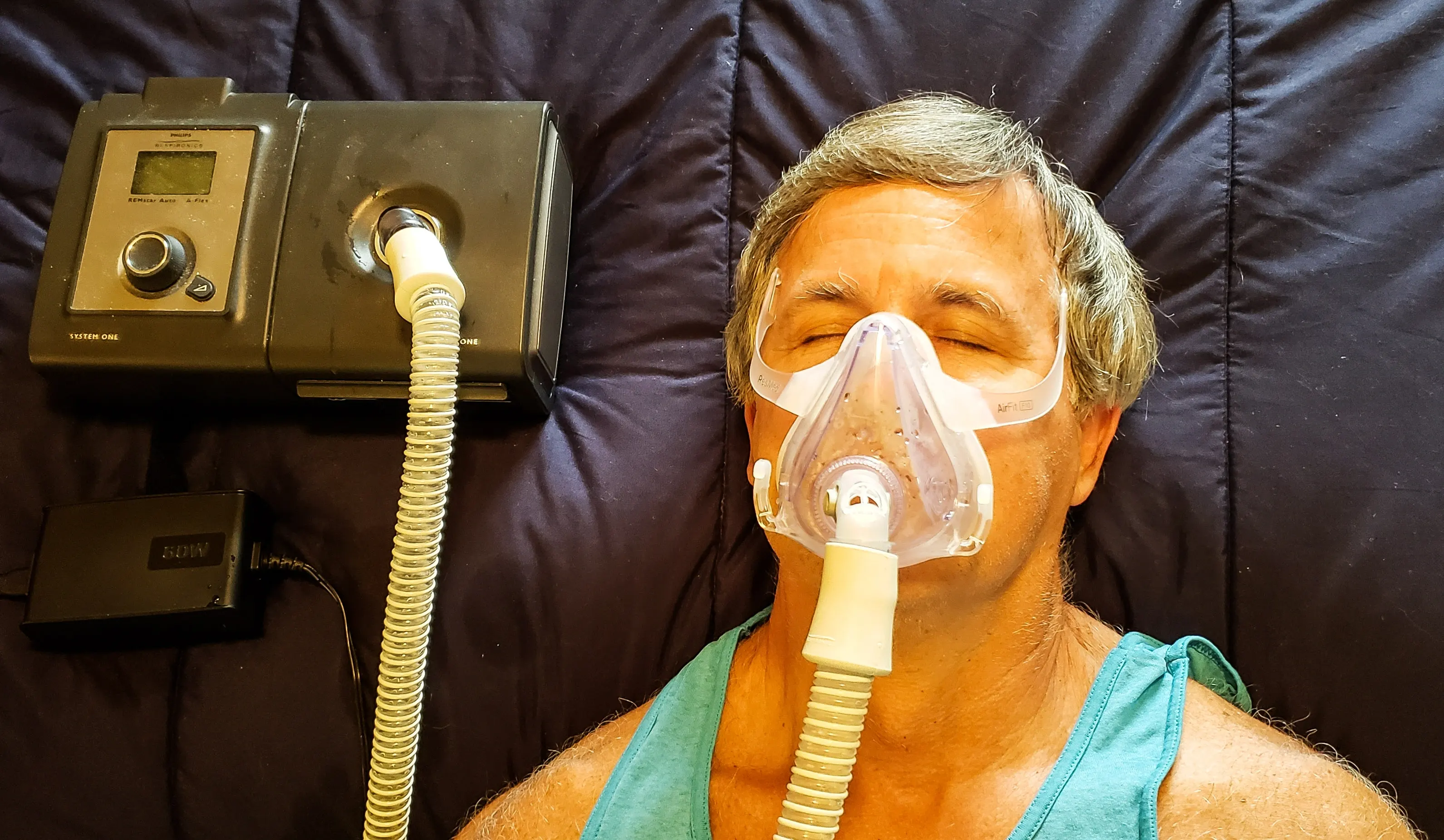Sleep apnea is more than just loud snoring or restless nights; it’s a serious condition that can have lasting effects on your overall health, particularly your heart. The repeated pauses in breathing put significant strain on the cardiovascular system, increasing the risk of issues like hypertension and irregular heart rhythms.
Sleep apnea significantly raises the risk of cardiovascular disease, including high blood pressure and heart failure. Recognizing how sleep and heart health are connected is essential for taking steps toward better long-term well-being.
What Is Sleep Apnea?

Sleep apnea is a sleep disorder where breathing repeatedly stops and starts during the night, often without the person realizing it. These interruptions reduce oxygen flow and disrupt sleep quality, which can lead to serious health problems, including cardiovascular issues.
It also causes intermittent hypoxia, repeated drops in blood oxygen levels during the night, which triggers a cascade of harmful effects throughout the body.
Types of Sleep Apnea
- Obstructive Sleep Apnea: This is the most common type, occurring when the muscles in the back of the throat relax too much, causing the airway to narrow or close entirely. As a result, breathing temporarily stops until the brain wakes the person up just enough to reopen the airway. These micro-awakenings are usually so brief that people don't remember them, but they severely fragment sleep quality.
- Central Sleep Apnea: Unlike OSA, central sleep apnea isn’t caused by a physical blockage. Instead, it happens when the brain doesn’t send consistent signals to the muscles that control breathing. This form is less common and often linked to other medical issues like heart failure, stroke, or the use of certain medications like opioids.
- Complex Sleep Apnea Syndrome: This is a combination of both obstructive and central sleep apnea. It’s typically discovered when someone with diagnosed OSA begins CPAP therapy and continues to have symptoms, revealing the presence of central apnea episodes as well.
Common Symptoms
Recognizing sleep apnea symptoms is a critical first step in understanding its potential impact on overall health, including heart disease risk. Here are some of the most common symptoms associated with sleep apnea.
- Loud Snoring: Snoring that’s especially loud, chronic, and disruptive is a hallmark of obstructive sleep apnea. It’s caused by turbulent airflow through a narrowed or partially blocked airway and may be more pronounced when sleeping on the back.
- Gasping for Air During Sleep: People with sleep apnea often wake up abruptly with a choking or gasping sensation as the body reacts to the lack of oxygen. These episodes may frighten bed partners but are often not remembered by the person affected.
- Excessive Daytime Sleepiness: Because the body never gets a full night of restorative sleep, people with sleep apnea often feel exhausted during the day, struggle to stay awake in meetings or while driving, and may even fall asleep unintentionally.
- Morning Headaches: Waking up with a headache can be a result of fluctuating oxygen and carbon dioxide levels throughout the night. These headaches tend to improve within a few hours of being awake.
- Difficulty Concentrating: Chronic sleep disruption and oxygen deprivation can lead to cognitive issues like memory lapses, poor concentration, irritability, and a general feeling of mental fog, all of which affect daily functioning.
The Link Between Sleep Apnea and Heart Disease
The relationship between sleep apnea and heart disease is strong and well-documented. When sleep apnea goes untreated, it doesn’t just affect your quality of rest; it puts significant strain on your cardiovascular system.
The repeated interruptions in breathing lower the oxygen levels in the blood, forcing the heart to work harder and contributing to inflammation, high blood pressure, and irregular heart rhythms. Over time, these effects can increase the risk of serious conditions like heart attacks, strokes, and chronic heart failure.
How Does Sleep Apnea Affect the Heart
Sleep apnea doesn’t just disrupt rest; it places serious strain on the heart and circulatory system. Here’s how sleep apnea directly affects heart function and increases disease risk.
- Reduced Oxygen Levels: Every time breathing stops during sleep, oxygen levels in the blood drop. This lack of oxygen (called hypoxia) stresses the entire cardiovascular system, forcing the heart to pump harder and faster to compensate, which can weaken the heart muscle over time. This damage promotes platelet activation, making the blood more likely to clot, increasing the risk of heart attacks and strokes.
- Increased Blood Pressure: Each apnea episode triggers a brief spike in blood pressure as the body reacts to the oxygen drop and arousal from sleep. These repeated spikes can lead to chronic hypertension, even during the day, significantly increasing the risk of heart disease.
- Inflammation and Oxidative Stress: Sleep apnea contributes to systemic inflammation and oxidative stress, two key factors in the development of atherosclerosis (hardening of the arteries). Inflammatory markers remain elevated in people with untreated sleep apnea, which damages blood vessels and promotes plaque buildup.
- Endothelial Dysfunction: One of the earliest cardiovascular changes seen in people with untreated sleep apnea is endothelial dysfunction. This means the blood vessels can’t dilate properly or regulate blood flow effectively. Repeated oxygen deprivation and surges in stress hormones damage the endothelium, leading to inflammation, plaque buildup, and increased risk of heart attack or stroke.
- Promotes Sympathetic Nervous System Activation: Each time oxygen levels drop during sleep, the body triggers a "fight or flight" response, activating the sympathetic nervous system. This causes a surge in stress hormones like adrenaline, which elevates heart rate and blood pressure. Chronic activation of this system leads to sustained hypertension, increased heart workload, and long-term cardiovascular strain.
Heart Conditions Associated with Sleep Apnea
Sleep apnea is closely linked to several serious heart conditions, many of which develop or worsen due to the ongoing strain on the cardiovascular system. Below are some of the heart-related conditions commonly associated with sleep apnea.
- Hypertension: Hypertension is one of the most common complications of sleep apnea. The repeated surges in blood pressure during the night carry over into daytime levels, making it harder to manage even with medication.
- Coronary Artery Disease: The inflammation and stress caused by apnea episodes increase the risk of plaque buildup in the coronary arteries. This narrows the arteries and reduces blood flow to the heart, which can eventually lead to chest pain or heart attacks.
- Heart Arrhythmias: Sleep apnea increases the risk of irregular heart rhythms, especially atrial fibrillation. These arrhythmias are dangerous because they can reduce the heart’s ability to pump effectively and may lead to blood clots or stroke.
- Heart Failure: Over time, the heart may weaken from working harder under low-oxygen conditions, leading to heart failure. Sleep apnea is particularly common in people with existing heart failure and can make the condition worse if untreated.
- Stroke: The oxygen drops and blood pressure spikes associated with sleep apnea can increase the risk of stroke. People with severe sleep apnea are at significantly higher risk, especially if they also have other cardiovascular risk factors like hypertension or atrial fibrillation.
Risk Factors Shared by Sleep Apnea and Heart Disease

Heart disease and sleep apnea share common causes and outcomes. Many of the same lifestyle and health risks, such as diabetes or obesity, that contribute to heart disease also increase the likelihood of developing sleep apnea.
This overlap highlights the importance of addressing root causes through lifestyle changes, early intervention, and consistent medical care. Recognizing and managing these shared risk factors can significantly reduce your risk of both conditions.
Overlapping Risk Factors
Sleep apnea and heart disease share several risk factors, many of which are rooted in lifestyle and metabolic health. Here are some of the most significant shared risk factors to be aware of.
- Obesity: Excess weight, especially around the neck and abdomen, can narrow the airway and make breathing more difficult during sleep. Obesity also puts stress on the cardiovascular system, making it a major risk factor for both sleep apnea and heart disease.
- Smoking: Smoking inflames and irritates the airways, increasing the chance of airway collapse during sleep. It also damages blood vessels and contributes to plaque buildup, raising the risk of heart disease.
- Sedentary Lifestyle: Lack of regular physical activity contributes to weight gain, poor circulation, and higher blood pressure. A sedentary lifestyle weakens both respiratory and cardiovascular health, making it harder for the body to regulate breathing and heart function.
- Diabetes: People with type 2 diabetes often experience insulin resistance and inflammation, which are linked to both sleep apnea and heart disease. Sleep apnea can also worsen blood sugar control, creating a vicious cycle that increases health risks.
- Dyslipidemia: Abnormal levels of cholesterol and triglycerides in the blood, known as dyslipidemia, contribute to plaque buildup in the arteries. This condition often coexists with sleep apnea and further increases the risk of heart disease by promoting atherosclerosis and vascular inflammation.
When to See a Doctor

Sleep apnea often goes undiagnosed because people mistake its symptoms for normal tiredness or aging. However, ignoring the warning signs can lead to serious consequences, especially when it comes to heart health.
Doctors often assess sleep apnea severity using the Apnea-Hypopnea Index (AHI), which counts how many breathing interruptions occur per hour of sleep.
If you or someone you love experiences the following symptoms, it’s essential to consult a healthcare provider for proper evaluation and possibly a sleep study. Early diagnosis and treatment can prevent complications like high blood pressure, arrhythmias, or even heart failure.
Warning Signs You Shouldn’t Ignore
Some signs of sleep apnea may seem minor at first, but they can point to deeper health concerns. Catching these warning signs early can make a major difference in long-term outcomes. Watch for these red flags that may indicate a more serious underlying issue.
- Waking Up Tired Despite Full Sleep: Consistently feeling exhausted even after 7–9 hours of sleep could mean your sleep is being disrupted by apnea episodes. This unrefreshing sleep contributes to fatigue, brain fog, and poor daytime function.
- Persistent High Blood Pressure: If your blood pressure remains high despite lifestyle changes or medication, sleep apnea could be a hidden cause. Treating sleep apnea often helps lower blood pressure naturally.
- Family History of Heart Disease or Sleep Apnea: Genetics plays a role in both conditions, so a family history increases your risk. If you notice symptoms and have relatives with either issue, it's wise to seek medical advice early.
Treatment Options for Sleep Apnea with Cardiovascular Risk

Treating sleep apnea is not only essential for improving sleep, but it can also have a profound impact on heart health. By addressing the root causes of disordered breathing at night, many of the cardiovascular complications tied to sleep apnea can be reduced or even prevented.
Whether through medical devices, surgery, or lifestyle changes, the right treatment plan can improve both your nightly rest and your long-term well-being.
Treatment Options
- CPAP Therapy: CPAP is the most common and effective treatment for moderate to severe sleep apnea. It keeps the airway open during sleep, significantly reducing apnea episodes and improving oxygen flow.
- Oral Appliances: Custom-fitted dental devices reposition the jaw or tongue to keep the airway open. These are often recommended for people with mild to moderate sleep apnea who cannot tolerate CPAP.
- Surgery: In cases where structural issues like enlarged tonsils or a deviated septum cause apnea, surgery may be an option. Procedures vary but aim to remove or adjust tissue blocking the airway.
- Lifestyle Changes: Weight loss, quitting smoking, reducing alcohol, and exercising regularly can drastically improve or even eliminate symptoms in some patients. These changes also directly benefit heart health.
Cardiovascular Benefits of Treatment
Treating sleep apnea isn’t just about better sleep; it can also lead to meaningful improvements in heart health. Below are some of the major heart-related benefits that can result from managing sleep apnea effectively.
- Lowered Blood Pressure: Effective sleep apnea treatment can lead to a noticeable drop in both nighttime and daytime blood pressure, especially in people with resistant hypertension.
- Reduced Risk of Arrhythmias: Treating apnea helps stabilize the heart’s electrical activity, lowering the chances of irregular rhythms like atrial fibrillation.
- Improved Oxygenation and Sleep Quality: With consistent treatment, oxygen levels remain stable throughout the night, reducing strain on the heart and allowing for deeper, more restorative sleep.
- Decreased Chances of Heart Attacks and Strokes: Long-term treatment of sleep apnea is associated with fewer cardiovascular events. Patients who stay consistent with CPAP or other therapies often experience a significant drop in heart-related complications.
FAQs
Can Sleep Apnea Cause Heart Failure?
Yes, sleep apnea can contribute to the development and worsening of heart disease, leading to heart failure. The repeated drops in oxygen levels, increased blood pressure, and inflammation caused by untreated sleep apnea put significant stress on the cardiovascular system.
Does Treating Sleep Apnea Improve Heart Health and Help Hypertension?
Treating sleep apnea, especially with CPAP therapy or lifestyle changes, has been shown to improve heart health. Effective management helps lower blood pressure, reduce the risk of abnormal heart rhythms, and improve overall cardiovascular function, thereby lowering the chances of heart attacks and strokes.
Is Sleep Apnea Dangerous If Left Untreated?
Yes, untreated sleep apnea is dangerous and can lead to serious health complications. Beyond poor sleep quality, it increases the risk of high blood pressure, heart disease, stroke, diabetes, and even sudden death in severe cases.
Can CPAP Cause Heart Problems?
CPAP therapy is generally safe and helps reduce heart problems by improving breathing during sleep. However, in rare cases, improper use or underlying conditions might cause complications, so it’s important to follow medical guidance closely.
Conclusion
Sleep apnea is a serious condition that affects both your sleep quality and your heart health. Because it shares many risk factors with heart disease and can directly cause cardiovascular problems, early diagnosis and treatment are essential.
By recognizing symptoms and managing sleep apnea effectively through therapies and lifestyle changes, you can protect your heart and improve your overall quality of life.
Dom Abraham
As the lead content writer at Sleepiverse. Dom pours his heart into writing mattress reviews, bedding product reviews, and medically-reviewed health articles. Dom is from Portugal and likes to spend his free time writing on the beach as it gives him a sense of comfort. Aside from writing mattress reviews in front of the soothing beach view, Dom likes to experiment with new amazing food ideas.


